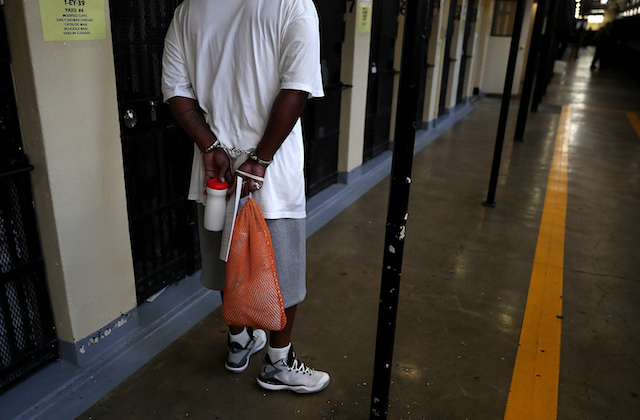House Approves Controversial Prison Reform Measure

A bipartisan prison reform bill that aims to reduce recidivism rates and better prepare incarcerated people for life after imprisonment was easily approved by the House of Representatives yesterday (May 22). But the measure, criticized for its lack of sentencing reform provisions, faces a difficult path in the Senate.
The FIRST STEP Act, sponsored by Representatives Hakeem Jeffries (D-N.Y.) and Doug Collins (R-Ga.) and approved in a 360-59 vote, calls on the Bureau of Prisons (BOP) to boost rehabilitative services to incarcerated people and offer credit toward early completion of their sentences. It also expands job training opportunities as a way to reduce recidivism rates.
But the measure, supported by President Donald Trump, has been criticized by civil rights groups and Democrats in the House and Senate. Last week, five Democrats wrote an open letter panning the measure as a "step backwards" that falls short of meaningful prison reform.
"We believe that prison reform will fail if we do not address the mandatory minimum sentences that have filled our prisons with individuals convicted of nonviolent offenses," wrote Senators Richard Durbin of Illinois, Cory Booker of New Jersey and Kamala Harris of California, and Representatives Sheila Jackson Lee of Texas and John Lewis of Georgia.
"Our federal prison population has grown by over 700 percent since 1980," they added, "and federal prison spending has climbed nearly 600 percent. The largest increase in the federal prison population is nonviolent drug offenders, and this problem is made worse by inflexible mandatory minimum sentences."
Civil rights groups have echoed the criticism, saying mandatory minimums have especially taken a toll on communities of color. In a joint statement issued earlier this month, some 70 rights groups said the FIRST STEP Act will not be effective unless it eliminates mandatory minimum sentences and mitigates "disparate impacts on communities of color."
The American Civil Liberties Union (ACLU), in its criticism of the measure, also pointed to the burden that low-level offenses have placed on Black and Brown communities.
"The true cost of this country’s addiction to incarceration is measured in human lives—specifically the generations of young Black and Latino men who serve long prison sentences, and are lost to their families and communities for decades," Jesselyn McCurdy, deputy director of the Washington Legislative Office at the ACLU, said in a statement.
The bill faces sizable Republican opposition in the Senate, including Committee on the Judiciary Chairman Chuck Grassley of Iowa, who last year championed sentencing reform in a measure that would have curbed sentences for nonviolent drug offenders. “For any criminal justice reform proposal to win approval in the Senate, it must include these sentencing reforms to prison sentencing," Grassley said earlier this month.
With opposition from Grassley and other Republicans on his committee, Majority Leader Mitch McConnell (R-Ky.) has indicated that he is unlikely to bring the measure before the Senate unless Republicans iron out their differences.
